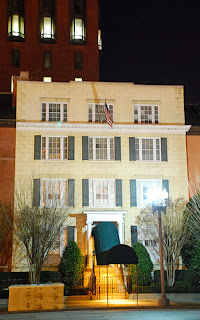 |
| Moldovan staff from the embassy at dinner at a local restaurant |
My impression of Moldovans also fit the description Mom heard. For example, whenever the ambassador made an official call on Moldovan government officials with a demarche, the fancy name for presenting an official position or making an official request, the Moldovan response was most often to ask her what they should do or say. They didn't begin from a stance that they should oppose whatever the U.S. said. They asked for her opinion.
One time several Moldovan government officials arranged to meet with U.N. officials in Vienna. They flew to Vienna for the meetings, but the U.N. officials told them they didn't have time to meet that week. Instead of demanding that the officials meet with them while they were in town, they flew back to Moldova.
On another occasion, the Moldovans pressed the ambassador for specifications for the wall that OBO had insisted in the lease that the Moldovans build around the embassy property. The Bureau of Diplomatic Security (DS) seemed reluctant to provide the specifications, probably because our enemies could use that information when planning attacks against us. DS preferred to have Americans with security clearance build walls or erect fences. But the Moldovans continued to try to do what they had promised. It took the ambassador's determination that we shouldn't require the Moldovans to build the wall without specifications as they didn't have a lot of spare cash to waste. She told OBO the clause about building the wall should be removed from the lease and that building the wall should be added to the contract for renovating the embassy.
 |
| Map of Bessarabia. The green, yellow, and magenta areas make up what was Bessarabia. |
An example of the difference in the cultures happened when Alex and I took another of the Americans at the embassy, Sarah, with us to Iaşi. Our first stop was at an official money exchange at Piaţa Unirii in the center of town to get Romania lei for our shopping trip. Just before we entered the exchange house, a young man approached Sarah and asked her a question in Romanian. Sarah spoke Romanian very well, so she answered his question and then continued into the exchange. The young man followed and got in line behind her. But instead of making his way to the counter after Sarah, he followed us out to the plaza where vendors had stalls set up like a flea market. Sarah saw a table with books and found one she wanted. But as she put her hand into her pocket to take out her cash, she found another hand there and it was removing her cash. She turned around quickly to chase him and shouted that he had picked her pocket. No one else made any effort to stop the man. That isn't the likely scenario had the same thing had happened in Chişinău.
 |
| Image of Blair House by afagen, via Flickr.com |
No comments:
Post a Comment